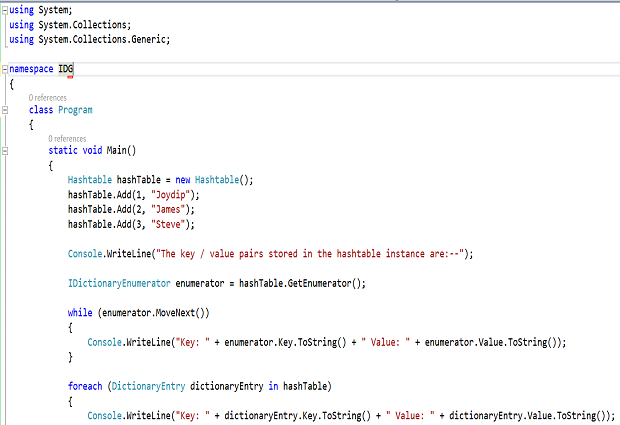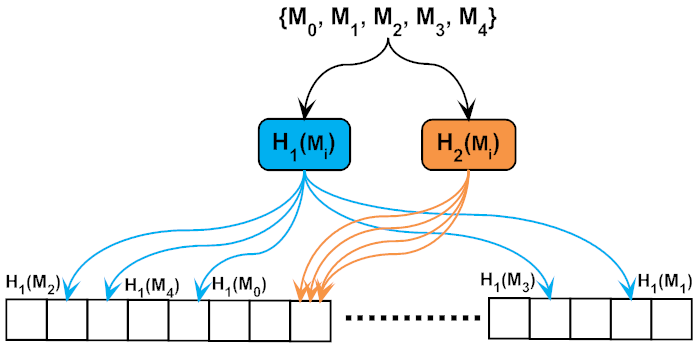. Implements a dictionary's functionality. Functions/definitions in this program are used in speller.c to help create a. spellchecker. Functions include load, unload, check, and size. Load runs. through a text file full of words and loads them into memory as a hash table. (dictionary). Unload frees the memory the hash table is using. C Program To Implement Dictionary Using Hashing Functions In Excel; Hash TablesBy Eric SuhHash tables are an efficient implementation of a keyed array data structure,a structure sometimes known as an associative array or map. Hash Tables (§8.2) A hash function h maps keys of a given type to integers in a fixed interval 0, N −1 Example: h(x) =x mod N is a hash function for integer keys The integer h(x) is called the hash value of key x A hash table for a given key type consists of Hash function h Array (called table) of size N When implementing a dictionary with.
C Program To Implement Dictionary Using Hashing Functions Pdf
Idea of a Hash Table
 In this problem you will implement a dictionary using a hash table
In this problem you will implement a dictionary using a hash table .The idea of a hash table is very simple, and decidedly hackish.
.The idea of a hash table is very simple, and decidedly hackish. We are going to write a hash table to store strings, but the same idea can beadapted to any other datatype. We write a function (the hash function)that takes a string and'hashes' it, i.e. returns an integer (possibly large) that is obtainedby manipulating the bytes of the input string. For a good hash functionall bytes of the input string must affect the output, and the dependance of the output on the strings should be non-obvious. Here is an exampleof a good hash function (actual library code), which uses the factthat a character is interpreted as a small integer: For the C++ class strings the same function will look like this:
With some such hash function, we try the following idea. Declare an arrayof length N and, for any string str, store the stringin the slot in the array. Since the results of hashing a string appear random (but, of course, the resultfor any given string is always the same) the above number for the slotto store the string in will hopefully be distributed uniformly through the array. If we want to check if a string is already stored in our array, we hash the string and look at the slot determined by the aboveformula. The best distribution of indices for the above hash function hasbeen observed to be with the following values of N:

It may happen that two different strings hash to the sameslot number, collide. If N is large enough, there won't be many such collisions. This difficulty can be resolved as follows: our array will be an array of lists of stringsinstead of indivudual strings. These lists are called bucketsin some books. Thus the algorithm for adding a string to the hash tableis:
For a string str:
Exercise (Problem D)
On UNIX systems there is a file that contains all frequently usedwords of the English language, usually /usr/dict/words.Here is one, zipped: words.zip. Writeyour hash table for strings, and fill it in by reading that file.Something like this will do:There are 45402 words in my file, so reasonable choices for hash tablesize are 12289, 24593, and 49157. You can make you class keep statisticsof the largest and the average number of collisions (i.e. sizes of buckets).
Write A C Program To Implement Functions Of Dictionary Using Hashing
Then, in the same manner as above, read in a text file and print outall words that are possible spelling errors. Write a member functionbool HashTable::Contains(const string & ). There is a Unixprogram ispell that does something like that.
Pesky technical problems
C Program To Implement Dictionary Using Hashing Functions
Notice that from the point of view of the program above, any sequenceof non-whitespace characters is a word. Whitespace characters (space,newline and tab) are seen as word separators and skipped. Thus youneed to remove any punctuation marks (except apostrophes) from your file being spell checked,before you can run the program on your text, so that 'end.' , 'end!', 'end?' and 'end' are not different words. This can be done by another small program, or by search-and-replace in any good text editor. There isalso the issue of capital vs. lowercase letters: 'And' and 'and'should be the same word. This issue, unfortunately, cannot be resolvedwith any text editor (other than Emacs) that I know of. I can pre-processfor you any text file, as follows:
Dictionary
Both of these preparatory tasks can be carried out with just two commands of the UNIX operating system:The first command changes any character which is not a letter in theranges A-Z or a-z or a newline n into a space. The second commandchanges each capital letter to the corresponding lowercase one. See man tr on your UNIX system for more information.Nothing like that on MS Windows or MacOS.